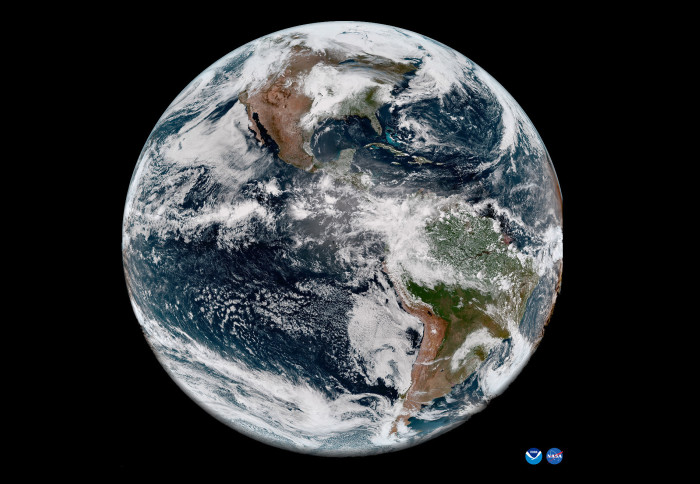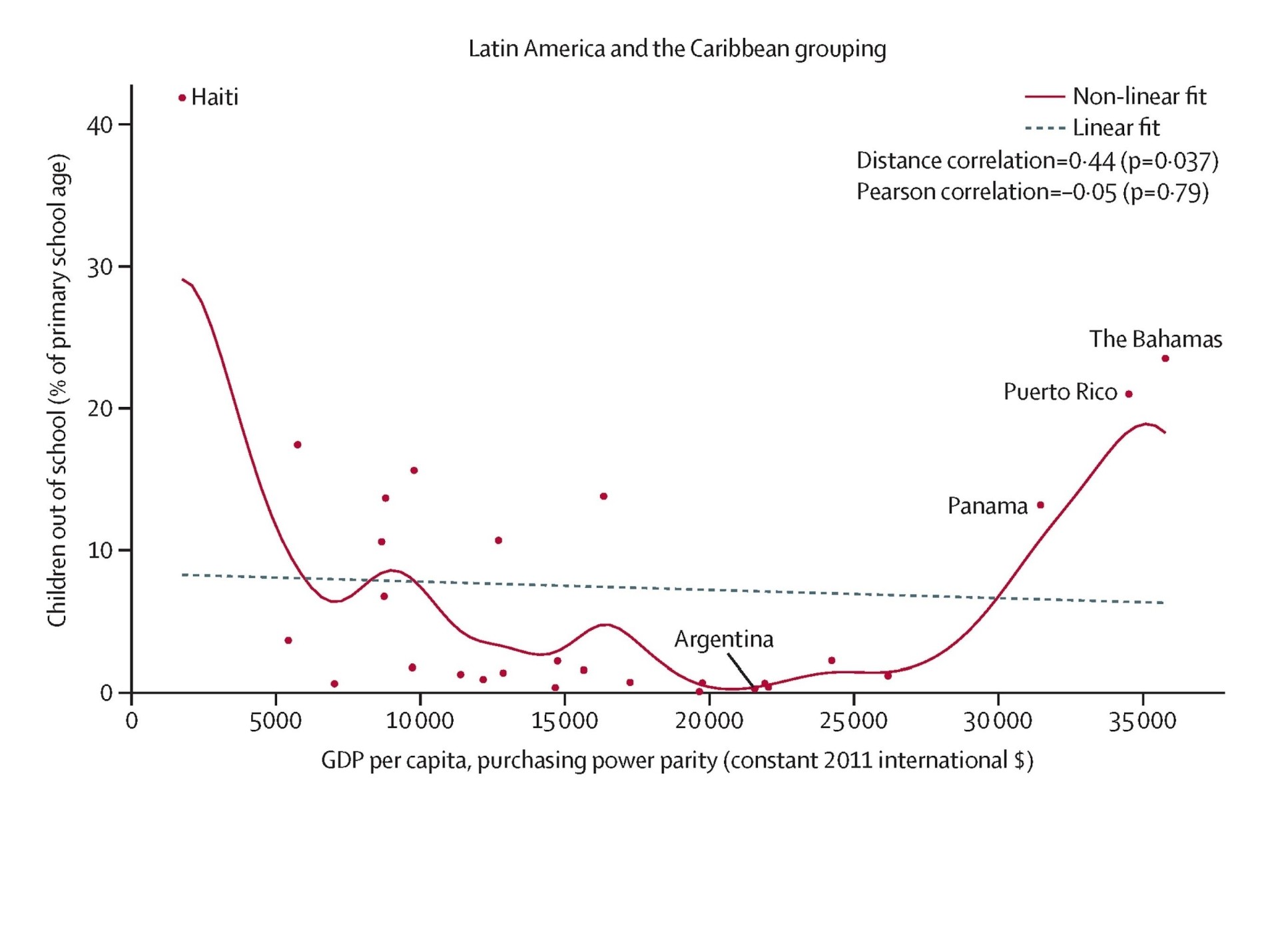Working together: global partnerships and tipping points

Earth from Orbit: NOAA Debuts First Imagery from GOES-18. Credit: NASA
Research shows that global partnerships are essential in tackling climate change, improving education, and reducing poverty.
Research postgraduate, Felix Laumann, is based at Imperial’s Department of Mathematics. Along with his supervisor, Professor Mauricio Barahona, he recently led an international research team that analysed 400 indicator variables collected from more than 150 countries over the last 20 years to investigate the interactions between two United Nations (UN) agendas: the Paris Agreement on climate change and the Sustainable Development Goals (SDGs).
Their findings, recently published in The Lancet Planetary Health, show that global partnerships are central to efforts to reduce climate change, as well as to improve educational standards in low-income countries, or reduce poverty globally. By considering different geographical and socio-economic groupings of countries, such as Global South and Global North or Western and Eastern Africa, the results stress the need to define goals in accordance with local circumstances and priorities, leveraging the expertise of regional stakeholders.
We caught up with Felix to find out more about his PhD research in this area.
Hi Felix – so, how did you refine the research question?
My collaborators and I have always been interested in data that can help build up and capture a complex picture of human experience, that's able to describe how sustainable, fair and equal life is on planet Earth. The aim is not only to explore causes of climate change more thoroughly, but also to link those issues with other social issues, like fair justice systems, equal opportunities for people from different backgrounds and raising the living standards of citizens in low-income countries.
In 2015 all UN member states agreed to work collectively by defining the SDGs and the Paris Agreement. Joint data collection, which tracked how effectively member states were progressing in reaching the goals of these two agendas, began in 2018. We became curious about how the efforts of governments, businesses and citizens in progressing certain goals might at the same time influence and affect other targets of these agendas, perhaps in unexpected or unintended directions.
Can you give an example?
SDG 7 focuses on providing electricity to every household in low-income countries. Achieving this by installing diesel generators in every village, however, would harm efforts to combat climate change, which is the goal set out in the Paris Agreement, as well as polluting the local air, which is to be improved as part of the SDG 3 on health.
So, we quickly started to see the SDGs and the Paris Agreement as one interlinked system where each component – the goals of the two agendas – potentially influence each other. We also asked ourselves if considering only simple linear relationships between the goals – that when one goal is improved, another one is automatically improved or diminished – was a realistic assumption.
Where do tipping points come into your analyses?
It might be easy to assume that an increase in gross domestic product (GDP), which is the value of all produced goods and services in a country (and part of SDG 8 on economic growth), automatically means that many families can afford to send their children to school (part of SDG 4). However, this is actually not true in all countries. The positive influence can, in fact, reach certain limits, which are sometimes referred as “tipping points”. In Latin America, for example, we found that some countries still have very high rates of children out of school, even though their GDP is comparatively high and has continued to grow. When a relationship like the one described above is revealed, we speak of tipping points. In the figure below (taken from our publication), Panama, Puerto Rico and The Bahamas are above such a tipping point.
 After plotting many more figures like the one above, we concluded that a non-linear measure to calculate whether two goals are related or not, and if related how strongly, must be taken as the basis of our analysis.
After plotting many more figures like the one above, we concluded that a non-linear measure to calculate whether two goals are related or not, and if related how strongly, must be taken as the basis of our analysis.
Tell us a bit about how you arrived at this PhD topic
I would have loved to have studied maths all my life! But I actually started with a BSc in Mechanical Engineering and an MSc in Computer Engineering. Mathematics and physics are still at the core of any engineering field, which made it not too difficult to change the field to maths, but I am still learning from my colleagues in the Department a lot more than they learn from me! Every day I am grateful that I can work with such a knowledgeable supervisor and colleagues, and that I can explore some of my strongest interests – sustainability, climate change, and poverty reduction – with the lens of a mathematician, or statistician.
How can scientific research be made meaningful in different contexts – in the policy-making world for example, or that of a huge international body like the UN?
It’s difficult but not unachievable. In academia, we tend to speak with colleagues in the same or very related fields, which consequently means that we use the same jargon and technical terms. Policymakers may be familiar with some of these terms, but not all. I think it’s incredibly important to find ways to communicate academic research clearly to people who have the power to leverage it in their decision-making. This begins with getting to know the background of the person we want to communicate our findings to. It's not necessarily about simplifying the research, but perhaps getting away from using highly technical terms, even if they’re the most appropriate – or making sure you find ways to explain them clearly.
One of our collaborators, Thiago Kanashiro Uehara, in fact comes from a very different background. He was at the Centre for Environmental Policy (CEP) at Imperial and currently works at Chatham House as a Policy Researcher. It was challenging but very rewarding to find a common vocabulary and our publication significantly benefited from having him in our team.
In what ways is it useful to streamline agendas like the Paris Agreement and the SDGs, and in what ways can it cause issues or miscommunication?
We should aim to be a world-team when it comes to tackling these global issues [but] still leverage local expertise to put in place the most effective action items in every country or region. Felix Laumann Research Postgraduate, Department of Mathematics
Consequences of the pandemic and globalisation – like shortages of computer chips, long delivery periods for goods from China and elsewhere, and global inflation – all of which we’re experiencing right now, show us how interlinked social and economic issues are. It highlights how far-reaching and comprehensive agendas, like the Paris Agreement and the SDGs, are strongly dependent on each other: one cannot be achieved without achieving the other.
We should aim to be a world-team when it comes to tackling these global issues. Climate change clearly has global effects, but citizens of Costa Rica and Bhutan, for example – both economies that absorb more carbon than they produce – suffer exactly as much as residents of the UK, India or the US, who produce a lot more carbon than they absorb. But our work also shows that whilst trying to align such global goals, we should still leverage local expertise to put in place the most effective action items in every country or region.
Are tipping points generally unexpected? How does this impact the ability to put goals into action?
We’re experiencing a tipping point with global inflation right now. Central banks issued large amounts of cash to businesses and citizens during COVID-19 lockdowns, but there was less opportunity to spend it during 2020 and 2021 apart from online. Now that we’re out of lockdown, and the opportunity to spend is available again, we’ve seen citizens spend more than usual – the amount of goods and services that can be purchased, however, is the same if not less as before. This means that businesses can charge more for goods and services. So, the linear relationship of issuing more cash reached a tipping point because businesses and citizens can purchase less now considering the increase in prices by inflation.
In what ways can a fundamental science like mathematics underpin sciences that are then applied/translated into policy?
I see the fundamental sciences like mathematics as “supporters” for other academic and applied fields, such as some aspects of economics. This requires academics in the fundamental sciences to show interest in what can be achieved with their research in applied fields, and try to communicate it effectively to academics in the applied sciences.
Scientific journals seem to be targeted at certain groups of readers who have the required specialist background knowledge. Such journals need to exist, of course, but it would be great to see more interdisciplinary journals that want to make research accessible to academics in other fields.
Where will the research go from here?
The most important finding is that relationships between different goals of the Paris Agreement and the SDGs cannot be seen as straightforward, linear dependencies. Tipping points are of paramount importance and need to always be kept in mind. Another important finding is that interactions vary strongly across different geographies. How goals are influencing each other in South America is, for example, very different to Eastern Asia. Our findings indicate that including local expertise in any policymaking could be crucial.
From here, we want to find out cause-effect relationships between economic activities that influence the goals set out in the Paris Agreement and the SDGs, which is something we have not yet done.
Article text (excluding photos or graphics) © Imperial College London.
Photos and graphics subject to third party copyright used with permission or © Imperial College London.
Reporter
Claudia Cannon
The Grantham Institute for Climate Change